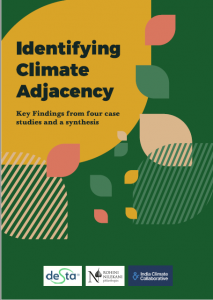Identifying Climate Adjacency – key findings from four case studies and a synthesis
More often than not, people are aware that their work and actions have climate adjacencies. Farmers agree that the excessive use of pesticides and fertilizer reduces the soil’s ability to remain fertile and makes farming more vulnerable to rainfall changes. Pastoralists are finding it hard to cope with the increased climate stress, partly attributable to growth in livestock populations and sedentarization. And organizations working with farmers and pastoralists realize that some of their interventions that improve livelihoods also cause an increase in emissions.
Despite this, climate change, as a sector, is seen in isolation. To make people take cognizance of the climate linkages that exist across sectors and projects, Rohini Nilekani Philanthropies partnered with DESTA Research LLP to make these linkages explicitly clear. Through a series of workshops, DESTA helped field partners identify climate linkages in non-climate focused projects.
Mapping a project’s influence on the local ecosystem and livelihoods helped agencies understand how they related with the adaptive capacity of people to deal with climate change, reduced emission sources, or improved sequestration. Such mapping brought out the implicit connections between project work and climate change that existed in people’s minds more explicitly.
This report is the synthesis of that work, with broader implications for the climate space.

